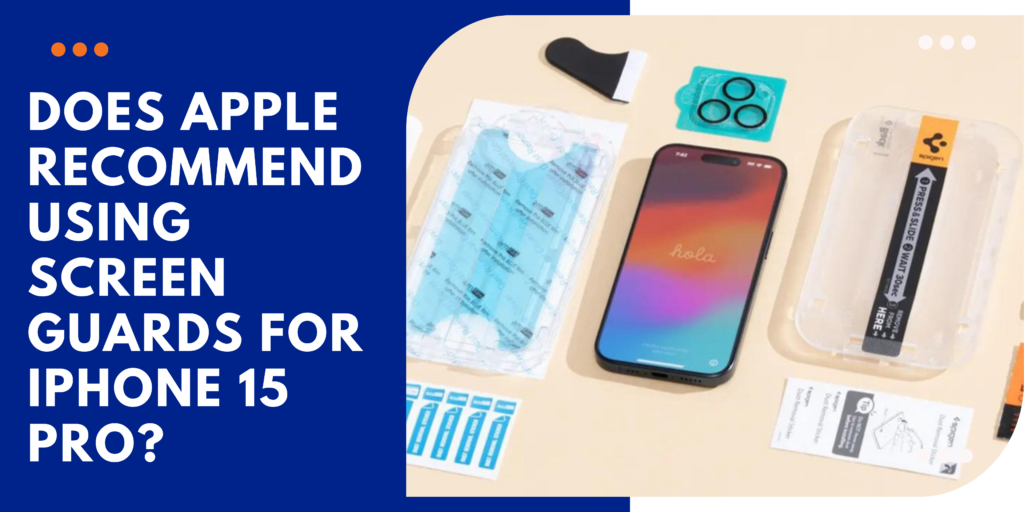Does Apple Recommend Using Screen Guards for iPhone 15 Pro?
With the release of the iPhone 15 Pro, Apple enthusiasts are eager to explore the latest features and advancements in technology. One common concern among iPhone users is whether using a screen guard is necessary to protect the device’s display. While Apple has not explicitly recommended the use of screen guards for the iPhone 15 Pro, various factors should be considered when deciding whether to invest in this additional accessory.

Apple’s Stance on Screen Guards
As of my last knowledge update in January 2023, Apple has traditionally refrained from explicitly endorsing or recommending third-party accessories, including screen guards. Apple designs its devices with meticulous attention to detail, ensuring durability and resistance to everyday wear and tear. The iPhone’s display is typically made from robust materials, such as Corning’s Gorilla Glass, which is known for its scratch-resistant properties.
Apple’s reluctance to endorse screen guards may stem from the company’s commitment to delivering a seamless user experience without compromising on design aesthetics. The iPhone’s display is optimised for clarity, colour accuracy, and touch sensitivity, and Apple aims to maintain these qualities without interference from additional layers.
Factors to Consider:
While Apple may not explicitly recommend screen guards, users should consider their individual preferences, habits, and environments when deciding whether to use one. Here are some factors to consider:
1. Are Scratches a Concern?
The iPhone 15 Pro boasts a robust display, but it’s not invincible to scratches. If you frequently toss your phone into bags or pockets with keys or other abrasive items, a screen guard could be your device’s first line of defence against unsightly scratches.
2. How Clumsy Are You?
Accidental drops happen to the best of us. If you find yourself fumbling with your phone more often than you’d like to admit, a screen guard with impact-resistant features could be a worthwhile investment in preventing cracks and shattered displays.
3. Do You Prefer a Natural Feel?
Some users appreciate the iPhone’s sleek design and the natural feel of its display. If you’re one of them, the decision to use a screen guard becomes a balance between protection and maintaining the original touch experience.
4. Are Smudges a Pet Peeve?
Apple equips its iPhone displays with an oleophobic coating to resist fingerprints. If you’re particular about keeping your screen smudge-free, choosing a screen guard with a similar coating might be a solution.
5. What’s Your Budget?
Screen guards come in various price ranges. Consider your budget when exploring options – from basic, budget-friendly protectors to premium, feature-rich screen guards with enhanced durability.
6. Are You Into DIY Installation?
The installation process varies among screen guards. Some are easy to apply, while others might require precision and patience. If you’re not a fan of meticulous installation processes, opt for a user-friendly screen guard.
7. Do You Value Clarity?
The iPhone’s display is optimized for clarity and color accuracy. Some screen guards may impact visual quality. Investing in a high-quality, transparent screen guard can help maintain the clarity you expect from your iPhone.
8. Are You Brand-Conscious?
Reputable brands often provide better quality and durability. Consider purchasing a screen guard from a well-known manufacturer to ensure you get a product that meets your expectations.
9. Are You Planning to Resell?
Maintaining your device in pristine condition can enhance its resale value. If you plan to upgrade your iPhone in the future, a screen guard could protect your device, making it more appealing to potential buyers.
10.Have You Checked Apple’s Latest Recommendations?
Technology evolves, and so do manufacturer recommendations. Stay updated on Apple’s official guidelines regarding accessories and screen guards. They may release updates or provide new insights that could influence your decision.
Summing Up!
As of now, Apple does not explicitly recommend using screen guards for the iPhone 15 Pro. However, the decision to use one ultimately depends on individual preferences and priorities. Users who prioritise additional protection against scratches, impacts, or fingerprints may choose to invest in a high-quality screen guard from a reputable manufacturer. It’s essential to weigh the potential benefits against any impact on the device’s display quality and touch sensitivity. As technology evolves, Apple may provide updated guidance on accessory usage, so users should stay informed about any changes in recommendations.
To know more about Tempered Screen Guards for iWatches –
FAQs
1. Should I use a screen guard on my iPhone 15 Pro?
It depends on your preferences and needs. Consider factors like scratch resistance and impact protection.
2. Will a screen guard affect touch sensitivity?
Quality screen guards maintain touch sensitivity, but choose a reputable brand and follow installation instructions.
3. Can a screen guard prevent scratches on my iPhone 15 Pro?
It adds extra protection, but effectiveness depends on the quality of the screen guard.
4. Do I need a professional for installation?
Most screen guards come with DIY instructions, no professional installation required.
5. Do some screen guards resist fingerprints?
Yes, many have an oleophobic coating for fingerprint resistance.
6. Can a screen guard prevent cracks and shattering?
It adds a layer of protection, but may not guarantee complete prevention.
7. Are expensive screen guards worth it?
Depends on priorities. Higher-priced options may offer better materials and features.
8. Can I use any screen guard for iPhone 15 Pro?
Choose a screen guard specifically designed for iPhone 15 Pro for proper fit and compatibility.
9. Will using a screen guard affect my iPhone’s warranty?
Generally no, but if the screen guard causes damage, Apple may not cover repairs under warranty.
10. Does Apple provide official screen guard recommendations?
As of my last update in January 2023, Apple had not provided specific recommendations. Check for updates on their official website or contact customer support.

